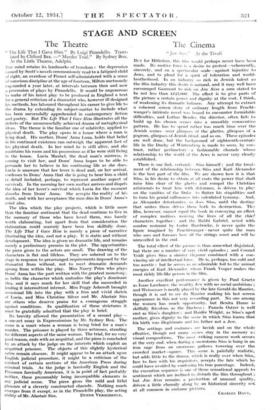The Cinema
"Jew Sii,s." At the Tivoli
BuT for Hitlerisrn. this film would perhaps never have been made. Its motive force is a desire to protest—vehemently, smeerely, and on a spectacular scale—against injustice to Jews, and to plead for a spirit of toleration and world- brotherhood. In an industry so rich in Jewish talent as the film industry this desire is natural, and it may well have encouraged Gaurnont to risk on Jew Suss a sum stated to be not less than £125,000. The effect is to give parts of the picture a certain power and dignity at the cost, I think, of weakening its dramatic balance. Any attempt to extract a coherent screen story of ordinary length from Feucht- wanger's intricate novel was bound to encounter formidable difficulties, and 'Lothar Mendes, the director, often fails to build up his chosen scenes into a smoothly consecutive pattern. He has to spend rather too much time over the Jewish scenes—over glimpses of the ghetto, glimpses of a pogrom, glimpses of Jewish ritual, and so on. These episodes are well done, but the background of eighteenth-century life in the Duchy of Wiirteniberg is made to seem, by con- trast, rather perfunctory - a fashionable charade whose relationship to the world of the Jews is never very clearly established.
There is one link. certainly --Siiss himself ; and the treat- ment of the relationship bet ween Suss and Karl Alexander is the best part of the film. We are shown how it is that Siiss, in his desire to obtain at all costs the power that shall raise him clear of the ghetto and compel the Christian aristocrats to treat him with deference, is driven to play on the vanities of the Duke to flatter his stupidities and to turn his genial callousness into calculated tyranny. And, as Alexander deteriorates, so does Silas, until the destiny that unites them drives them both to destruction. Th,s film, however, cannot equal the book in conveying an effect of complex motives weaving the lives of all the chief characters together : and the Rabbi Gabriel, acted with sombre restraint by Cedric Hardwicke, is never quite the figure imagined by Felicia wanger—never quite the man who sees and foresees how all the strings must and will be unravelled in the end.
The total effect of the picture is thus somewhat disjointed, but there are a number of very vivid episodes ; and Conrad Veidt gives Sfiss a sinister elegance combined with a con- vincing air of intellectual force. He is, perhaps, too cold and too ascetic but he serves as an admirable foil to the animal energies of Karl Alexander. whom Frank Vosper makes the most richly life-like person in the film.
Another excellent performance is given by Paul Gractz as Isaac Landauer, the wealthy Jew with no social ambitions ; and Weissensee is neatly played by the late Gerald du Maurier, though it is sad to see du Maurier making his last screen appearance in this not very rewarding part. No one among the women has much opportunity, but Benita Hume is skilfully frivolous as the Duchess ; Pamela Ostrer is welt cast as Sfiss's daughter and Haidee Wright, as Sass's aged mother, gives dignity to the scene in which Siiss learns that his birth was illegitimate and his father not a Jew.
The settings and costumes are lavish and on the whole effective, though not many scenes stay in the memory a t visual compositions. The most striking camera work occurs at the very end, when during a snowstorm Siiss is hung in an iron cage from an enormous gallows towering over the crowded market - square. This scene is painfully realistic, but adds little to the drama, which is really over when Silas, face to face with his inquisitors. accepts the fate which he could have avoided by confessing his true parentage. Indeed. the execution sequence is one of those sensational appeals to sentiment which are inclined to disturb the film throughout ; but Jew Siiss remains a production of unusual quality, driven a little clumsily along by an historical sincerity not at all common in costume pictures. . CHARLES DAVY.,














































 Previous page
Previous page